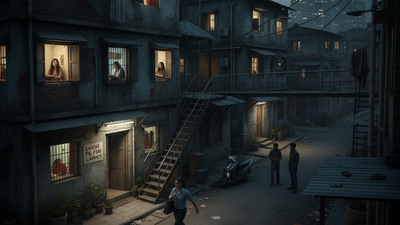ARTICLE AD BOX

THIRUVANANTHAPURAM: It’s a nondescript standalone house in a residential neighbourhood in Kazhakkoottam that’s been converted into a ladies’ hostel. As inmates arrived at different times at the end of the day, it seems someone left a door unlocked.
Benjamin, a truck driver who stole things from similar hostels nearby, sneaked in and found a girl sleeping in a room and raped her. The gruesome incident points to the appalling danger concerning such hostels that have mushroomed in the city.Driven by the chance to charge more rent and also to meet the housing needs of hundreds of students — many of them civil services aspirants and those attending coaching for competitive exams — and also young women who work in IT and other enterprises, people have started to convert their standalone houses into hostels in the city.

There are no boards because these hostels are not registered. Often there will be cretaker or a cook but no security guards. Only a few have CCTV cameras. Accommodation facilities are advertised on social media. Notices with phone numbers are distributed at coaching centres for candidates to find them.Such houses turned into hostels are functioning in almost every key neighbourhood, notably in areas off MG Road near Statue, Vazhuthacaud, Edapazhinji, Pattom, PMG Junction, Kuravankonam, Kariavattom and Kazhakkoottam.
They offer the much-needed housing with food in the city which lacks enough properly run ladies hostels. Taking a house on rent is difficult because conservative residents do not want single women as tenants.However, this highlights two types of violations: Commercial ventures operating from private houses without licences and food being prepared and served without undergoing food safety checks.Reshma C, a civil service aspirant who stayed in a few hostels, said: “My room was on the ground floor next to the hall at a house in Vazhuthacaud.
As inmates arrive at different times at night, the front door was not often latched from the inside. Anyone could walk in from the street. My room had an attached toilet but other rooms did not. So, they told me not to latch my room’s door while sleeping. There was no security guard.
I refused and shifted later.” The next hostel she moved to in Pattom was a three-storey house but was far better. There were CCTV cameras. The owner was present round the clock. “There was a homely atmosphere. Students preferred it. But there was no security guard,” she added. In some of these hostels, the front door’s keys are either given to the inmates to enter and leave as per their convenience or the door is not kept locked. There is no one to stop intruders. Perhaps, this was one of the reasons Benjamin targeted hostels to steal. It has been days since Benjamin was arrested, but neither the police nor the city corporation have launched a crackdown on these unregistered hostels. Sandhya A, a parent, said, “There is a need to have a good security system. If hiring a guard is not feasible, there should be CCTV cameras at the gate and at the front door.” She said a male relative of a girl managed to walk in, found the room, and met her at the hostel in Attukal while the caretaker and cook were absent from the building.The owner earns rent several-fold higher than what they would get from renting the house to a family.
For a single room, the charge is Rs 10,000-12,000. “The hostel where my daughter stays has around 10 girls, many of them training for civil services,” she added. Sophia Easo, a lawyer, said that women staying in such places are doing so at their own risk. “Often, people only look for accommodation based on space availability and food provision. This is largely because they usually have less than a week to find a place before joining work or a course.
Hostels should only be allowed to operate after passing health inspections and receiving certification from relevant authorities.
I hope the govt will now take action.” City corporation secretary S Jahamgir said: “We are taking action against these establishments as and when we come across one. These come under the residential category, but there is a difference in tax and there should be licensing.” But what flummoxes the authorities is that many of these hostels are like people accommodating students as guests in their houses and offering food. So they can’t be technically considered as hostels.
This remains a grey area. The city corporation inspected and cracked down on some such hostels, especially the ones housing staff of textiles, in 2014.

 10 hours ago
3
10 hours ago
3









 English (US) ·
English (US) ·